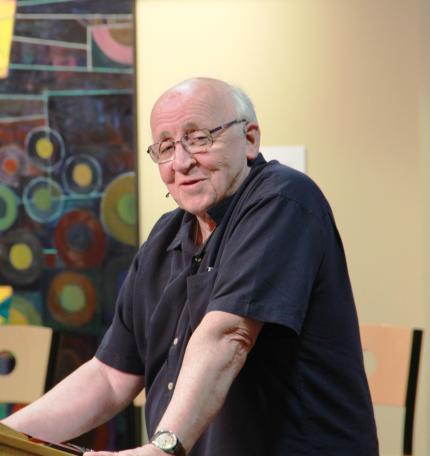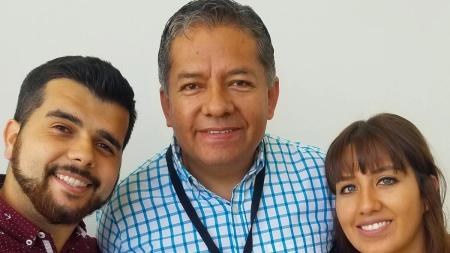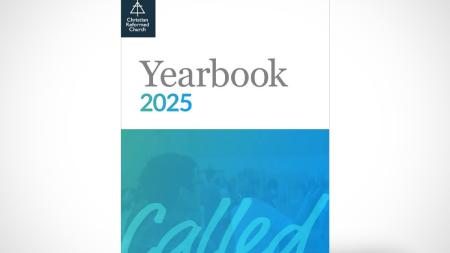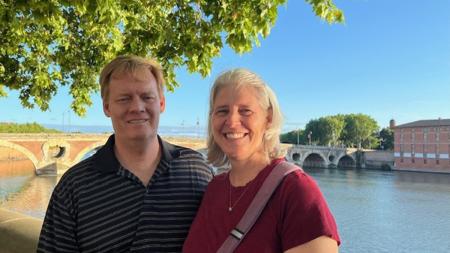Mouw Speaks about Loving Our Neighbors

Richard Mouw
Amanda Smartt, Calvin Seminary
Several years ago a Jewish rabbi from the American Jewish Committee visited Richard Mouw in his office at Fuller Theological Seminary.
They spoke for more than an hour about freedom of the press. Afterward the rabbi told Mouw, who was then president of the seminary, how pleased he was by the hospitality Mouw showed.
Before arriving to talk with Mouw, the rabbi said, he had broken out in a cold sweat. He had been frightened and had no idea how the evangelical leader would respond to him.
“He told me how he grew up as the only Jewish student in his public school and how he was bullied in the school yard and called a Christ-killer by the other kids,” Mouw said during his opening address at a conference titled “Loving Your Neighbor Today: The Second Great Commandment in Today’s World,” which runs through Thursday at Calvin Theological Seminary.
Mouw told this story to illustrate the need to be legitimately kind and open to people of other religions. In doing this, you reach out in humility as one human to another.
And then when and if you have the opportunity to speak about Christianity to someone such as the rabbi he met, said Mouw, you can only do so if there is a relationship established.
For this rabbi to hear anything about Jesus in his heart, said Mouw, “he would have to be comfortable with the person talking to him about Jesus.”
Mouw, who is now president emeritus of Fuller, has written and spoken for several years to audiences about the importance of cultivating Christian civility, of reaching out in kindness and conviction to your neighbor, be it someone like the rabbi he met, people of other races, or people who are struggling with issues of sexuality, he said.
In an article in the July issue of The Banner, Mouw writes that the “need to bring civility together with deep convictions is not just an option for Christians—it is an obligation grounded in biblical teaching.”
Mouw will offer a keynote address on Wednesday about “Neighborly Hospitality” and on Thursday considering the question “Are Our Neighbors ‘Jesus in Disguise’?”
Also speaking at the conference are several members of the Calvin Seminary faculty. On Tuesday, Cory Willson, a professor of missiology, spoke about “Loving Your Neighbor of Another Religion.”
Other topics include “What Can We Learn from the Old Testament about Loving Our Neighbor?” and “Loving Your Neighbor with Dementia.”
To open the conference, Mariano Avila, a professor of New Testament at the seminary, offered a meditation on Matthew 22:34-40, which talks about loving your neighbor as yourself.
He spoke of how the disciples of Jesus had a hard time loving their neighbors and, in fact, weren’t even sure who was their neighbor. In essence, said Avila, they believed that only their fellow Jews were their neighbors.
“It was dictated by their culture,” he said. “My neighbor is my own religious group and my home ground. Others really weren’t [considered as] neighbors.”
But Jesus taught the Great Commission and commanded his followers to go out and share the gospel with everyone, recognizing that everyone in the world was their neighbor, said Avila.
“Whom should I love? Can we let our light shine out to everyone?” he asked.
In the keynote presentation, Mouw focused on the call to share the gospel—and to do it by standing beside and getting to know those with whom you are hoping to share your faith in Jesus.
“I want to talk about what it means to equip God’s people for neighborly love so we can better serve the cause of Jesus Christ,” he said.
During his career Mouw has worked in building better relations with people who are Mormons, Jews, Catholics, Anabaptists, and Muslims. Always, he said, it has been important to listen in order to learn what others believe.
In the process, he has made many friendships with people with whom he has sought to build the kind of openness that will allow him to point them to the “all-sufficient answer, the Lord Jesus Christ.”
Mouw also spoke of how Christians today need not venture far from their own communities to find persons of many religious persuasions—or of none at all.
“People from the four corners of the world have now come to us. We have neighbors from near and far,” he said.
Near the end of his talk, Mouw told another story to illustrate his theme of finding ways to reach out and stand with one’s neighbor.
He recounted how he preached and held a workshop at a conservative Presbyterian church in southern California near the border of Mexico.
Filled with people who did not favor illegal immigration, the church found itself struggling with the issue and sought his help.
At one point during this process, a church member said he was an undocumented immigrant and explained how scared he was that the police would arrest him when he was driving his pregnant wife to the hospital and that he would be deported.
“People in the church ended up stepping forward and offering to drive, which one of them ended up doing,” Mouw said. “This was certainly an example of loving your neighbor.”
As he ended his address, Mouw said, “We need to be listening people, learning from people, understanding the hopes and fears of other people.”
Doing this, opening ourselves to our neighbors, Mouw said, is what Christ requires of us. And it is not simply a “set-up for evangelism.”


